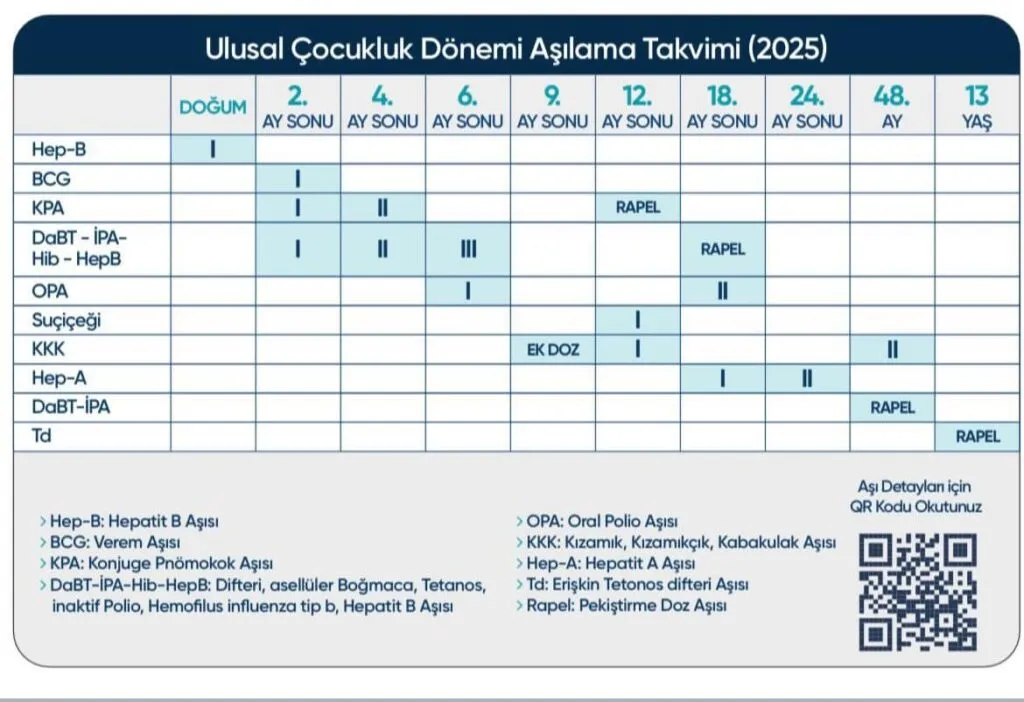- 9 months ago
Newborn Vaccination Schedule
Why Are Vaccinations Started in the Newborn Period?
At birth, babies carry a limited amount of maternal antibodies. This passive immunity is temporary and does not protect against many serious infections. That’s why active immunization through vaccines begins in the very first days of life—to build your baby’s own immune defense.
Vaccines expose the immune system to a harmless form of a pathogen, teaching it to recognize and respond swiftly in the future. Early immunization protects against life-threatening diseases such as hepatitis B, tuberculosis, pneumonia, and severe diarrheal illness, especially within the first 6 months.
Routine Newborn Vaccination Schedule in Turkey
Vaccines Given at Birth
1. Hepatitis B Vaccine – 1st dose
Administered within 24 hours after birth. Essential for protecting the baby against the hepatitis B virus, particularly if the mother is a carrier.
2. BCG (Tuberculosis Vaccine)
Typically administered in the first month, often at 2 months. It protects against severe forms of tuberculosis like TB meningitis and miliary TB.
3. Vitamin K Administration
Although not explicitly stated on the website, this is always performed immediately after birth according to standard clinical procedures. This procedure is essential.
4. Heel Stick (Newborn Metabolic Screening Test)
This is performed within the first 48–72 hours after birth. This is also related to birth.
5. Eye ointment application
This is not mentioned on the page, but some hospitals perform it.
Translated with DeepL.com (free version)
Other Routine Vaccines Given in the First 6 Months

Note: Booster doses for some vaccines are given in the following months as part of the national immunization schedule.
Recommended (Optional) Vaccines
Rotavirus Vaccine
Given orally in drops. Must be completed between 2–6 months. Helps prevent hospitalizations from severe viral diarrhea.
Meningococcal Vaccine (MenACWY and MenB)
Protects against meningitis and bloodstream infections. Not yet included in the national program but widely recommended by pediatricians.
Influenza Vaccine
Recommended annually after 6 months of age, particularly in autumn and winter seasons.
What to Expect After Vaccination
It’s common for babies to experience minor side effects following vaccinations. These are usually mild and resolve within 1–2 days:
- Redness, swelling, or tenderness at the injection site
- Mild fever
- Increased fussiness or crying
- Slight changes in sleep or feeding
Seek medical attention immediately if you observe high fever, breathing difficulty, widespread rash, or persistent inconsolable crying.
Parental Support and Vaccine Follow-Up
During every vaccination visit, Dr. Ekin Pasinlioğlu will explain:
- Which vaccines are administered and why
- When the next doses are scheduled
- What side effects to expect and how to manage them
- When to contact the clinic
- Information on optional vaccines based on current scientific evidence
All vaccinations are recorded in your child’s immunization chart, and reminder systems are used to ensure timely follow-up.
Why Choose Dr. Ekin Pasinlioğlu for Your Baby’s Vaccinations?
- Full adherence to the Turkish Ministry of Health’s current vaccination schedule
- Clear, objective guidance on optional vaccines
- Detailed pre- and post-vaccine counseling
- Monitoring of vaccine responses and side effects
Calm, transparent communication that replaces fear with confidence








